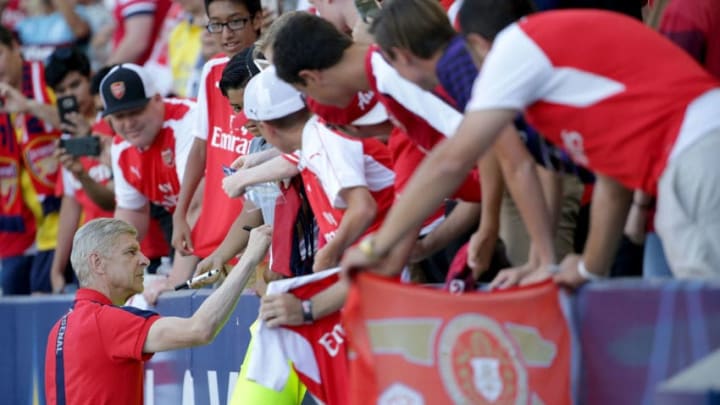Arsenal: Arsene Wenger made this American see the light
By Josh Sippie

Arsene Wenger’s tributes are pouring out all over the globe from inside Arsenal and out, so let this American throw one more on the pile.
There are a lot of reasons why someone starts following a team. It’s where they were born, it’s who they enjoyed watching growing up, it’s who was winning when they looked to pick a team. All of these could apply to any given Arsenal fan.
As an American, who grew up in the middle of the United States, where soccer (yeah, we call it that) was about as popular as creamed corn, I had no desire to watch the Premier League. Mainly because I didn’t know what it was. I didn’t know it existed. I used to feel shame at this, but I don’t anymore.
I loved my baseball, I even loved my American football (yuck) but nothing else really mattered in the sporting world, because that is what the traditional middle-America household focuses on. Even though I played organized soccer growing up, I never cared to watch it.
Related Story: Top 5 Arsene Wenger Replacements
I didn’t notice it for the first time until 2011. I picked up FIFA because I was starting to hate the NFL and the Madden video gaming franchise, and the first team on the list was Arsenal. It really isn’t any more dramatic than that. My love for Arsenal started because their name came first in the alphabet. But that’s not where it ended.
I played with Arsenal, loved their players – or at least the virtual representations of their players – and thought ‘hell, let’s see if they play like this in real life.’
So I woke up early one weekend and started watching. I don’t remember what it was that struck me first about watching them, but I never wanted to watch anything else. I stopped watching American football altogether, I started reading every book I could find about Arsenal and I learned about where they had come from.
Check out the latest episode of the Pain in the Arsenal Podcast here!
I never missed a game from that moment on and I hated that I had spent 21 years of my life unaware that such joy existed. I had never seen them win a title, never seen them in their prime – at least not live, I have since – but to me, the first thing I always looked for in my favorite teams was loyalty.
That’s why I loved the Houston Astros. Craig Biggio never left. That’s why I loved the San Antonio Spurs. Tim Duncan never left. For Arsenal, I learned that this was Arsene Wenger. They may be in a rough patch, but some of these players, these Jack Wilshere’s and Aaron Ramsey’s, they weren’t leaving because they felt a sense of loyalty above what they owed to themselves, and that was instilled in them by Arsene Wenger, one of the most loyal men in all of sports. And Wenger was bigger than a loyal second baseman. He was bigger than a loyal power forward. He was the masthead.
More from Pain in the Arsenal
- 3 observations from Arsenal’s victory at Goodison Park
- 3 standout players from 1-0 victory over Everton
- 3 positives & negatives from Goodison Park victory
- Arsenal vs PSV preview: Prediction, team news & lineups
- 3 talking points from Arsenal’s victory at Goodison Park
Then and now, loyalty is uncommon in sports. It’s unfashionable. Players and managers are celebrated if they make it five years, and even then, chances are, they are going to move on at some point. It’s an epidemic of wanderlust.
I have no doubts that Wenger could have won a Champions League somewhere else. I have no doubts that he could have achieved so much with Real Madrid or PSG, who would have been gushing to have him.
But I also have no doubts that even among the fiery outrage, Wenger never wanted to try out those places, quite simply because he never wanted to leave Arsenal.
By the point in my love for Arsenal that I recognized that Wenger was something different, there was no turning back, I was a Gooner, albeit a late-blooming one. But Wenger continued to fill me with pride because he was just as graceful in victory as he was in defeat. He was the standard bearer. There can never be any question about how much he loved the club and when that is the case, it makes being a fan so much easier. No matter what stresses plague the typical Gooner, I can happily say that Wenger was always a point of pride. There was nothing you could say badly about that man. I don’t know what it feels like to doubt the moral fiber of my team’s manager. I don’t know what it’s like to dislike their character. I am a spoiled fan.
There are mercenary managers out there. Guys who take whatever job is most likely to give them success. I would argue that about 95% of managers today are of that variety. But for Wenger, it was only ever Arsenal. There was no need for personal success, there was a need for team success.
Next: The Wenger Dynasty: Who's Next?
I’m an American, which I often feel like people expect me to apologize for. I have had so many readers and listeners, Gooners and otherwise, tell me that my opinion was null and void because I was an American and therefore, by default, didn’t know what I was talking about. But it never bothered me because I knew that Arsene Wenger wouldn’t have seen me as an American, but as a lover of Arsenal, which is all that really matters in the end.